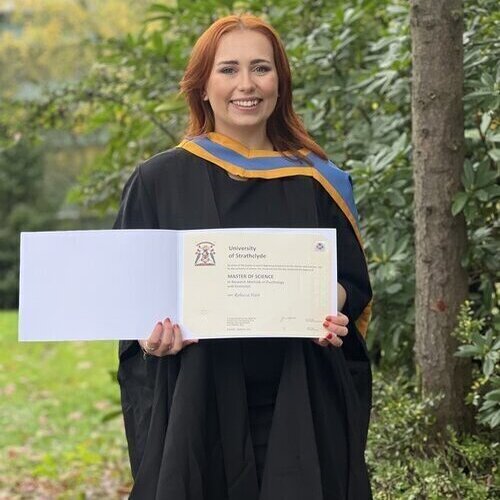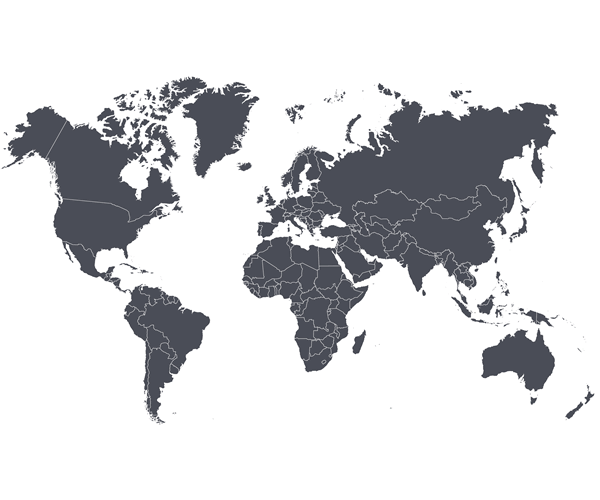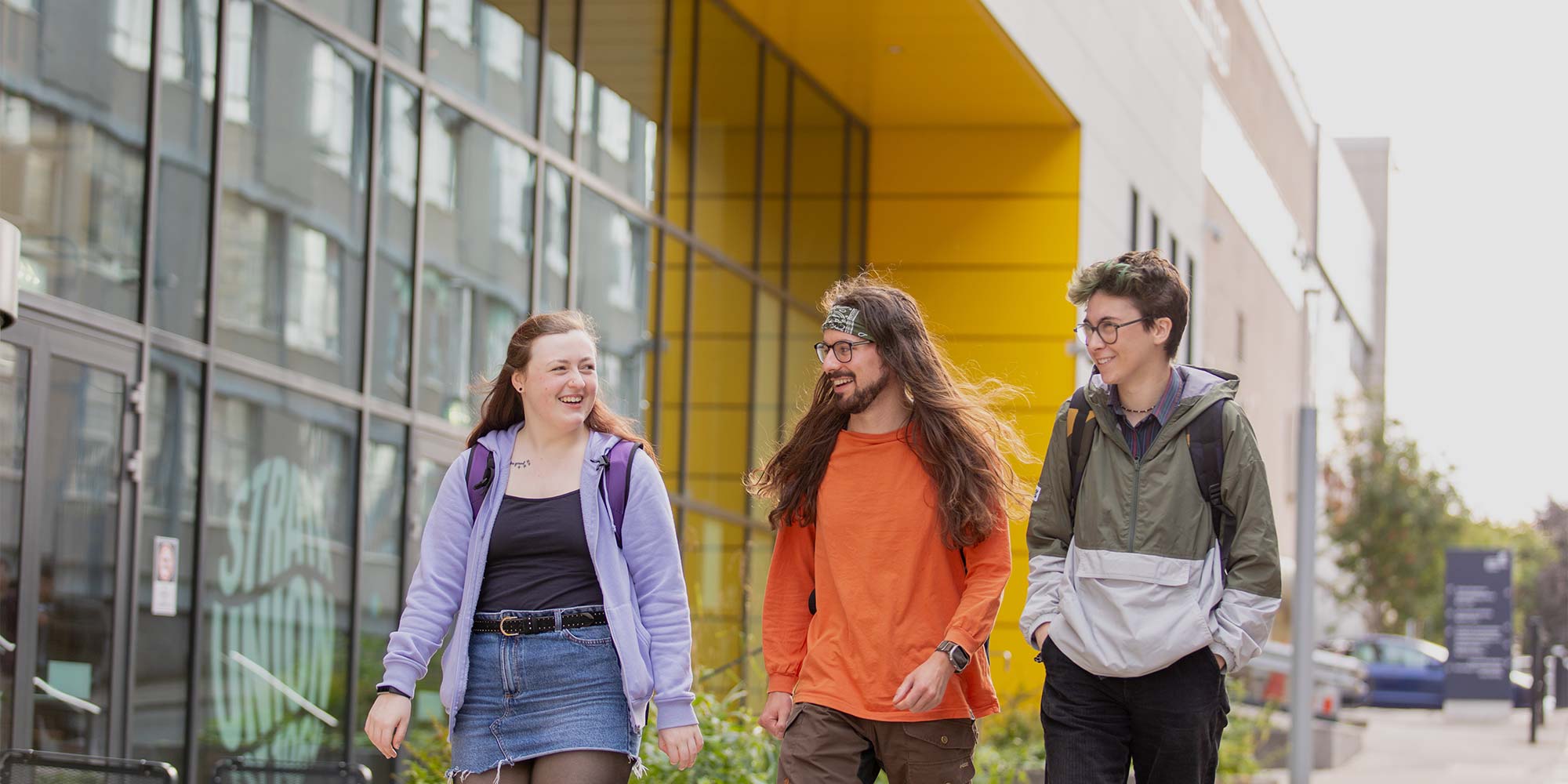MSc Research Methods in Psychology
ApplyKey facts
- Start date: September
- Study mode and duration: 12 months full-time
Scholarships: EU Engagement Scholarships worth £10,000 available to applicants from EU countries
Study with us
- learn the skills and theory for conducting research
- Undertake a large research project
- enhance your academic profile for doctoral funding applications or research assistant posts
- for those aiming to develop careers in research or enter subsequent training for a scientist practitioner-oriented career such as clinical or educational psychology
The Place of Useful Learning
UK University of the Year
Daily Mail University of the Year Awards 2026
Scottish University of the Year
The Sunday Times' Good University Guide 2026
Why this course?
This course is for those aiming to develop careers in research or enter subsequent training for a scientist practitioner-oriented career such as clinical or educational psychology.
It also provides a basis for further postgraduate study such as a PhD and applications for research assistant posts.
In addition to acquiring the skills and theory for conducting research, you'll have the opportunity to meet and discuss research with postgraduate students in the Department of Psychological Sciences and Health. You'll also play a role in research with members of our academic staff.
You may also have the opportunity to be employed within the department as a Graduate Teaching Assistant.


Interested in postgraduate study?
At the Faculty of Humanities and Social Sciences, our friendly and knowledgeable team will be available to provide you with all the information you need to kick-start your postgraduate journey at the University of Strathclyde. Register for upcoming events below:
What you'll study
This course is designed to maximise your research potential. It provides a thorough grounding in research methods for anyone wanting to apply for a research assistant post or for doctoral study or enter training for a scientist practitioner-oriented career such as educational or clinical psychology.
You'll devote a significant amount of time to a substantial research project and focus on producing a thesis that is potentially publishable in a peer-reviewed scientific journal.
In addition, you'll complete training in the philosophy of social research methods, quantitative and qualitative research methods and research design over two semesters. These taught modules will provide the training essential for the completion of the research project and for your subsequent career in research.
Learning & teaching
Taught classes are a mixture of tutorials, lectures, demonstrations and hands-on practical sessions to facilitate your learning.
Assessment
Each taught class has its own set of assessments including essays, reports, class tests, presentations and research proposals. The dissertation will cumulate in a thesis.
Facilities
The department has a range of specialist research equipment available for use (if relevant to the dissertation project):
- motion capture via a suite of six infra-red cameras
- a driving simulator which can be programmed to display different scenarios and be used in conjunction with other equipment
- several types of eye tracker available which have been used to examine topics such as word reading and bias in attention to alcohol-related stimuli
- two psychophysiology labs to measure electrodermal activity, heart activity, electromyographic signals and EEG
- experiment generator package ‘E-Prime’
- a variety of questionnaires and ability measures including access to the online survey tool ‘Qualtrics’
How to become a psychologist
Find out all you need to know including what a psychologist does, the different types of psychologist and the steps you need to take to become one.
Perspectives on Social Research
This module is intended as a general introduction to the processes of reasoning and practice in social research. It aims to help students understand the differences between key approaches to social science in terms of research design. It also aims to assist students critically engage with researchers from a range of different disciplines.
Quantitative Research Methods
This class aims to provide advanced training in a range of quantitative statistics likely to be required for analyses conducted in the dissertation. The class also aims to equip you with the statistical knowledge that is likely to be needed to aid the interpretation of results from previous empirical research. In addition, you'll develop the necessary statistical competences to support transfer to doctoral programmes and careers in academic or commercial research and teaching.
Research Design
This class aims to develop the skills required to undertake a substantial original research project. Taught sessions will focus on project conception and critical thinking, literature searching, understanding of ethical principles and codes of practice, and the generation of research proposals. Students will also learn how to develop and deliver research presentations to professional audiences.
Qualitative Research Methods
An introduction to the theoretical and practical aspects of using qualitative methods within Psychology. Specifically, the class will focus on developing qualitative research questions, designing appropriate methods of data collection, and analysing qualitative data. To achieve this, you'll conduct a small group research project using qualitative methodologies.
Dissertation
Students will undertake a large research project, supervised by one of the academics in the Department of Psychological Sciences and Health.

I think the Strathclyde psychology department boasts some of the most interesting, professional, supportive, passionate and dedicated staff I’ve ever worked with.
MSc Research Methods in Psychology
Entry requirements
| Academic requirements | First-class or Second-class Honours degree in Psychology, or International equivalent. Applicants must be able to evidence that they have undertaken a statistics class/module and also a research methods class/module and completed a research project/dissertation in their undergraduate degree. If they have no previous statistics or research experience then they will struggle with the content of this programme. |
|---|---|
| English language requirements | Please check our English requirements before making your application. |

The staff in Strathclyde Psychology are extremely helpful and supportive, and genuinely want to see you succeed. I have always felt comfortable asking questions or asking for support, which has been crucial in my development as a researcher.
Chat to a student ambassador
If you want to know more about what it’s like to be a Humanities & Social Sciences student at the University of Strathclyde, a selection of our current students are here to help!
Our Unibuddy ambassadors can answer all the questions you might have about courses and studying at Strathclyde, along with offering insight into their experiences of life in Glasgow and Scotland.
International students
We've a thriving international community with students coming here to study from over 140 countries across the world. Find out all you need to know about studying in Glasgow at Strathclyde and hear from students about their experiences.

Faculty of Humanities & Social Sciences Scholarships
EU Engagement Scholarships are available to EU applicants who would have previously been eligible for Home (Scottish/EU) fee status.
Fees & funding
All fees quoted are for full-time courses and per academic year unless stated otherwise.
Fees may be subject to updates to maintain accuracy. Tuition fees will be notified in your offer letter.
All fees are in £ sterling, unless otherwise stated, and may be subject to revision.
Annual revision of fees
Students on programmes of study of more than one year (or studying standalone modules) should be aware that the majority of fees will increase annually.
The University will take a range of factors into account, including, but not limited to, UK inflation, changes in delivery costs and changes in Scottish and/or UK Government funding. Changes in fees will be published on the University website in October each year for the following year of study and any annual increase will be capped at a maximum of 10% per year. This cap will apply to fees from 2026/27 onwards, which will not increase by more than 10% from the previous year for continuing students.
| Scotland | £10,100 |
|---|---|
| England, Wales & Northern Ireland | £10,100 |
| Republic of Ireland |
If you are an Irish citizen and have been ordinary resident in the Republic of Ireland for the three years prior to the relevant date, and will be coming to Scotland for Educational purposes only, you will meet the criteria of England, Wales & Northern Ireland fee status. For more information and advice on tuition fee status, you can visit the UKCISA - International student advice and guidance - Scotland: fee status webpage. Find out more about the University of Strathclyde's fee assessments process. |
| International | £23,550 |
| Available scholarships | The Faculty of Humanities & Social Sciences is offering a fee reduction of up to 25% to employees of NHS partner agencies. Find out more about the 25% tuition fee reduction for NHS employees. Take a look at our scholarships search for funding opportunities. |
| Visa & immigration | International students may have associated visa and immigration costs. Please see student visa guidance for more information. |
Please note: The fees shown are annual and may be subject to an increase each year. Find out more about fees.
How can I fund my course?
Scottish postgraduate students
Scottish postgraduate students may be able to apply for support from the Student Awards Agency Scotland (SAAS). The support is in the form of a tuition fee loan and for eligible students, a living cost loan. Find out more about the support and how to apply.
Don’t forget to check our scholarship search for more help with fees and funding.
Students coming from England
Students ordinarily resident in England may be to apply for postgraduate support from Student Finance England. The support is a loan of up to £10,280 which can be used for both tuition fees and living costs. Find out more about the support and how to apply.
Don’t forget to check our scholarship search for more help with fees and funding.
Students coming from Wales
Students ordinarily resident in Wales may be to apply for postgraduate support from Student Finance Wales. The support is a loan of up to £10,280 which can be used for both tuition fees and living costs. Find out more about the support and how to apply.
Don’t forget to check our scholarship search for more help with fees and funding.
Students coming from Northern Ireland
Postgraduate students who are ordinarily resident in Northern Ireland may be able to apply for support from Student Finance Northern Ireland. The support is a tuition fee loan of up to £5,500. Find out more about the support and how to apply.
Don’t forget to check our scholarship search for more help with fees and funding.
International students
We've a large range of scholarships available to help you fund your studies. Check our scholarship search for more help with fees and funding.
Glasgow is Scotland's biggest & most cosmopolitan city
Our campus is based right in the very heart of Glasgow. We're in the city centre, next to the Merchant City, both of which are great locations for sightseeing, shopping and socialising alongside your studies.
Careers
The course is primarily designed for graduates in psychology who wish to begin a career in research. It's ideally suited to someone who wishes to apply for a post as a research assistant or wishes to apply for doctoral study.
Previous students have been successful in receiving PhD funding from the University, as well as externally funded studentships from a variety of sources including the Economic and Social Research Council, the Welcome Trust, the Carnegie Trust, and places at other universities.
The course also provides research training to graduates who may wish to enter professional training for jobs which have a ‘scientist-practitioner’ underpinning such as clinical psychology.
Apply
Start date: Sep 2026
Research Methods in Psychology
Contact us
Prospective student enquiries
Contact a member of our team on LiveChat between 10am and 4pm (GMT)
Telephone: +44 (0) 141 444 8600
Have you considered?
We've a range of postgraduate taught and Masters courses similar to this one which may also be of interest.

